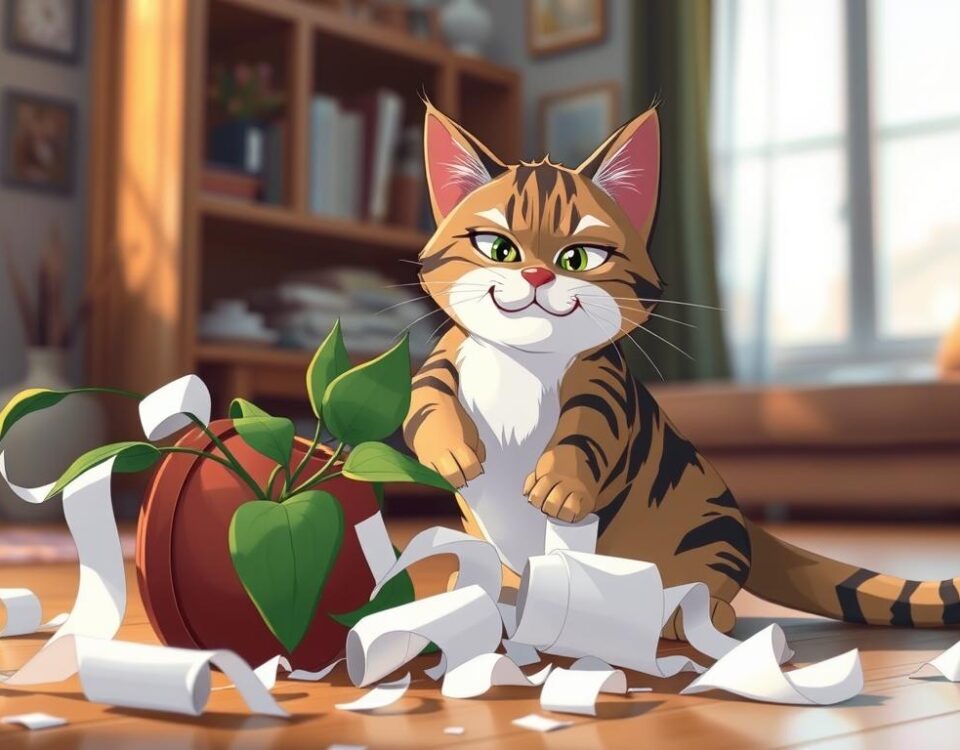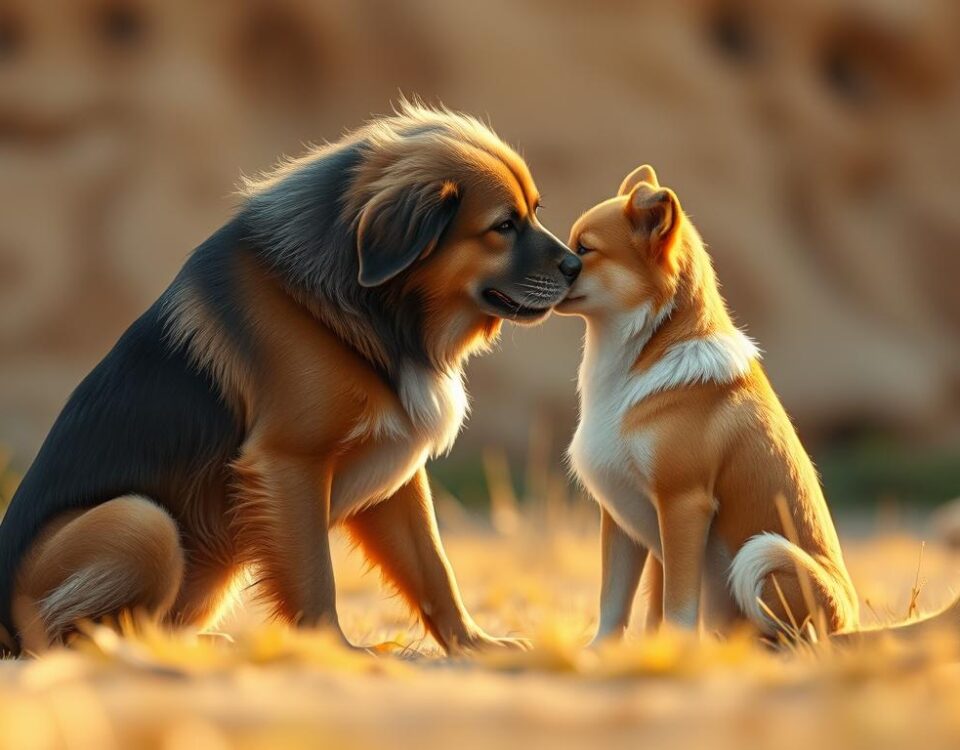
How to Stop My Cat from Peeing on Clothes? 7 Proven Solutions to Prevent Inappropriate Urination
May 14, 2025Dogs eating their own or other animals’ poop is called coprophagia. It’s a puzzling and unpleasant habit for many dog owners. It’s important to understand dog behavior and the reasons behind this habit.
Many things can make dogs eat poop, like not getting enough nutrients, health problems, and their environment. Luckily, there are ways to stop this behavior. These include changing their diet and using training techniques. why does my dog eat poop
Key Takeaways
- Understanding the causes of coprophagia is essential for effective solutions.
- Dietary adjustments can play a significant role in stopping coprophagia.
- Training and behavioral techniques are crucial for long-term success.
- Health issues should be ruled out by a veterinarian.
- Consistency and patience are key when addressing coprophagia.
Understanding Coprophagia in Dogs
Coprophagia is when dogs eat their own or others’ feces. It’s puzzling and worries pet owners about their dogs’ health.
What is Coprophagia?
Coprophagia is when dogs eat feces. This is a form of pica, where animals eat things they shouldn’t. It can be due to instinct or health issues.
How Common is This Behavior?
Many dogs eat feces, more than owners think. It’s believed that a lot of dogs do this at some time. Things like age, diet, and where they live can make it more likely.
Types of Poop Dogs Typically Eat
Dogs might eat their own poop or others’. This includes cat, horse, or dog poop.
“The consumption of feces can expose dogs to a variety of parasites and diseases, making it a serious health concern.”
Knowing what poop dogs eat helps understand why they do it.
Learning about coprophagia helps owners help their dogs stay healthy.
Why Does My Dog Eat Poop? Real Reasons and 7 Effective Ways to Stop It
Dogs eating feces is a common but puzzling behavior. It happens in many breeds and backgrounds. This behavior, called coprophagia, can come from natural instincts or health problems.
“Coprophagia is a complex issue with many causes,” says Dr. Smith, a famous vet. Knowing these causes helps us find ways to stop this bad habit.
Overview of Natural and Problematic Causes
Coprophagia can be caused by natural or problematic factors. Dogs might eat poop because of their instinct to scavenge or because of maternal behaviors. For example, mother dogs clean up their puppies’ poop to keep their den clean. This behavior can be learned by the puppies.
But, coprophagia can also mean there’s a health issue. This could be because of not getting enough nutrients, having digestive problems, or not absorbing food well. It might also be due to stress, anxiety, or boredom.
Brief Introduction to Solution Approaches
There are many ways to stop dogs from eating poop. We can change their diet and add supplements. We should clean up after they go to the bathroom right away. Teaching them commands to stop can also help.
We can use products to keep them away from poop. Giving them things to do and play with can also help. We should also deal with their anxiety and manage their environment.
Dr. Smith says, “Changing their diet, training, and adjusting their environment can really help dogs stop eating poop.” This not only makes dogs healthier but also makes life better for them and their owners. By finding and fixing the reasons and using the right solutions, we can stop dogs from eating poop.
Biological and Instinctual Reasons for Coprophagia
Dogs eat poop because of their biology and instincts. Their actions come from their ancestors and natural drives. Sometimes, these instincts lead to unwanted behaviors.
Maternal Cleaning Behaviors
Mother dogs clean their puppies by licking them, including their poop. This keeps the puppies safe from predators. Puppies learn from their mothers, and this behavior can seem normal to them.
Scavenging Instincts
Dogs are natural scavengers. Their instincts make them explore and eat many things, including poop. In the wild, eating feces was a way to find food.
Evolutionary Perspectives
Coprophagia is a behavior passed down through generations. In some places, eating feces helped keep a den clean. Knowing this helps us understand and stop the behavior.
Understanding why dogs eat poop helps owners find ways to stop it. We will talk about these strategies next.
Medical Causes Behind Poop Eating Behavior
Many health issues can make dogs eat poop. It’s important to know these reasons to help our dogs.
Nutritional Deficiencies
A dog’s diet is key to its health. If a dog’s food is not right, it might eat poop. Giving your dog the right food is a big step to stop this.
A vet said, “A diet lacking some nutrients can make dogs eat poop.”
“Nutritional deficiencies can be a big reason for dogs eating poop.”
Digestive Enzyme Issues
Problems with digestive enzymes can also cause dogs to eat poop. Dogs with these issues might not digest their food well. Digestive enzyme supplements can help.
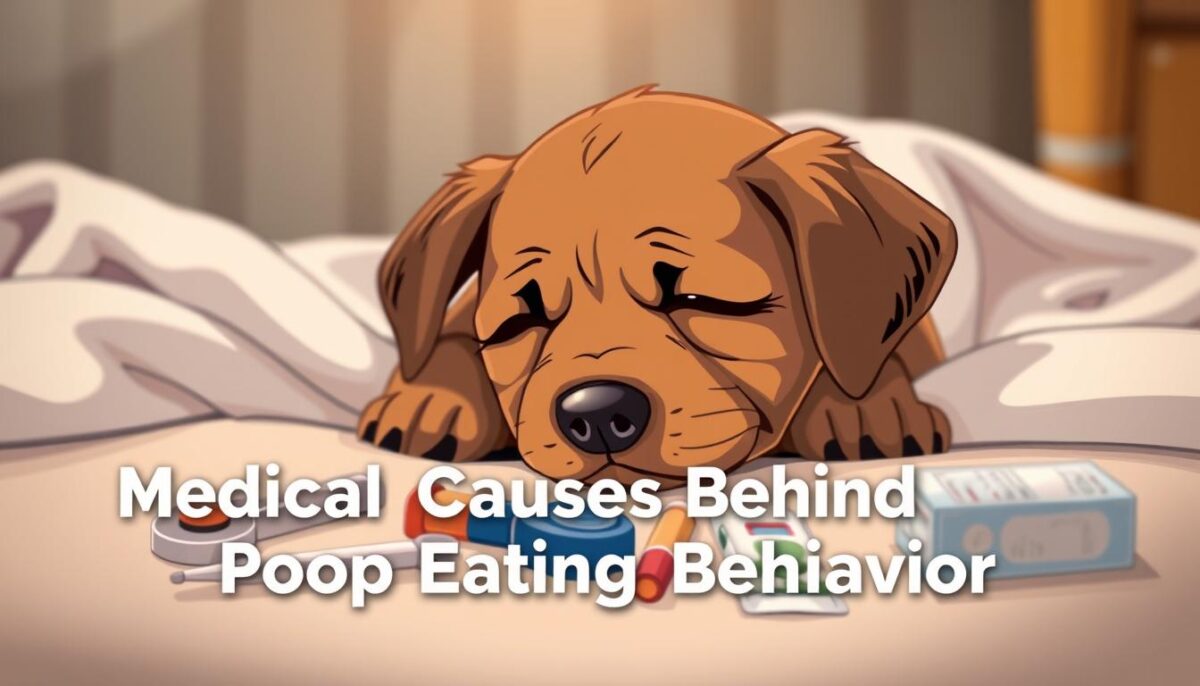
Malabsorption and Other Health Conditions
Some health problems, like malabsorption, can make dogs eat poop. These issues stop the body from getting nutrients. It’s important to see a vet to check for these problems.
Knowing why dogs eat poop helps us help them. It’s a big step to make our dogs healthier.
Psychological Factors That Contribute to Coprophagia
Eating feces, or coprophagia, is not just instinct or health issues. It’s also about the mind. Dogs do it for many mental and emotional reasons.
Attention-Seeking Behavior
Some dogs eat feces to get a reaction from their owners. If they get attention, good or bad, they might keep doing it. It’s a way for them to connect with their world.
Stress and Anxiety
Stress and anxiety make dogs eat feces. It’s a way for them to deal with stress. Changes at home, new pets, or work schedule changes can stress them out.
Boredom and Lack of Mental Stimulation
Dogs need to stay active and mentally sharp. Without enough to do, they might eat feces. Giving them plenty to do can stop this problem.
Understanding why dogs do this is key. Dog owners can then help their pets feel better mentally and emotionally.
Health Risks Associated With Dogs Eating Feces
Coprophagia is not just a gross habit; it’s also very dangerous for dogs. Dogs eating feces can get sick from many bad germs. These germs can cause serious health problems.
Parasites and Bacterial Infections
Dogs that eat feces might get sick from hookworms, roundworms, and tapeworms. They can also get Salmonella and E. coli infections. These can make their stomachs very sick.
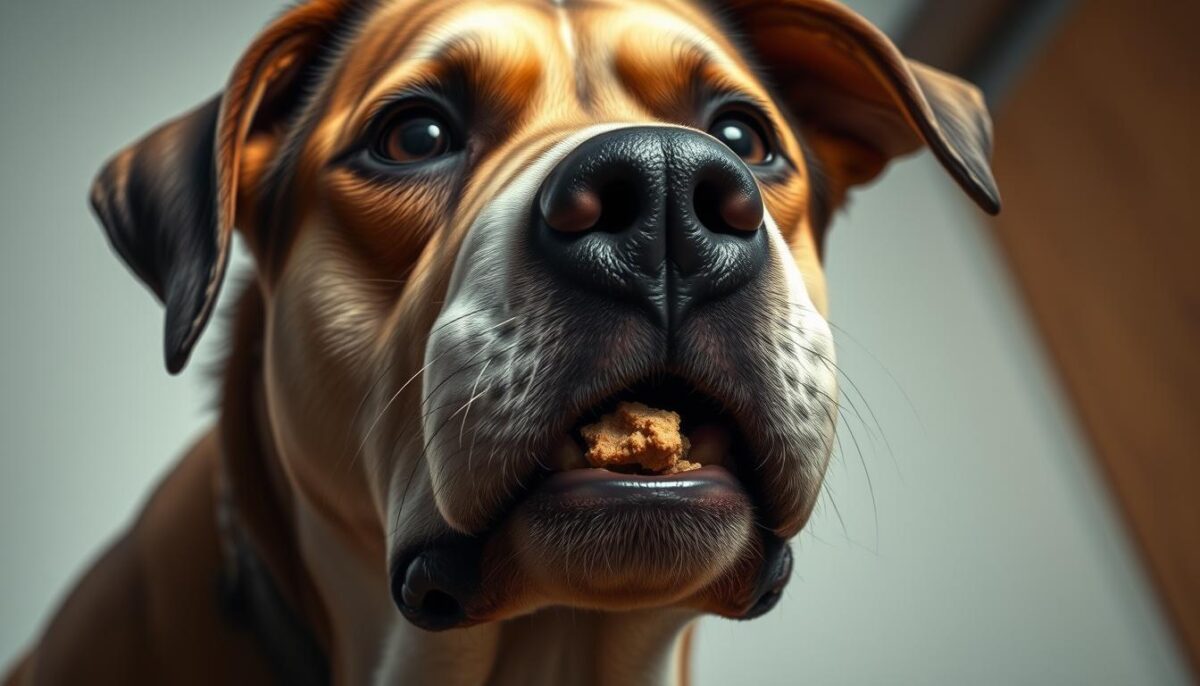
Digestive Issues
Eating feces can make dogs’ stomachs upset. They might throw up, have diarrhea, or hurt their belly. Sometimes, it can even make them very sick and need a vet.
Transmission of Disease to Humans
Dogs eating feces can also spread diseases to people. For example, hookworms and roundworms can go from dogs to humans. This is especially true for kids who play where dogs poop.
A vet said, “The risk of dogs giving diseases to people is a big worry. It’s especially true for families with little kids.” Dog owners need to stop this bad habit to keep everyone safe.
7 Effective Ways to Stop Your Dog From Eating Poop
Stopping your dog from eating poop needs a few steps. You’ll need to change their diet, train them, and make their environment better. Knowing why they do it and using the right methods can help a lot.
Dietary Adjustments and Supplements
First, make sure your dog eats well. They might eat poop because they’re not getting enough nutrients.
Enzyme Supplements
Enzyme supplements help your dog digest better. This makes them less likely to eat poop. Experts say adding these supplements can really help.
Vitamin B Supplementation
Vitamin B helps stop dogs from eating poop. But, you should talk to a vet about how much to give them.
Immediate Cleanup After Elimination
Keeping your dog’s area clean is very important. Cleaning up after them can stop them from eating poop.
Establishing a Cleanup Routine
Make cleaning up a regular thing. Use poop bags on walks and clean your yard often. This keeps your dog from finding poop.
Training Commands for Prevention
Teaching your dog commands can stop them from eating poop. The “Leave It” command is very useful.
“Leave It” Command Techniques
Teaching “Leave It” takes patience and consistency. Start with a treat and say “Leave It.” Give them a treat when they ignore it.
Using Deterrent Products
There are products that make poop taste bad to dogs. These can help stop them from eating it.
Commercial Deterrents
Commercial products come in powders and liquids. You can add them to your dog’s food. They make poop taste bad.
Natural Deterrent Options
For a natural way, try adding pineapple or pumpkin to their food. It makes their poop less tasty.
Providing Mental and Physical Stimulation
Dogs eat poop because they’re bored or not active enough. Give them enough to do and exercise.
Exercise Requirements by Breed
Different dogs need different amounts of exercise. Find out what your dog needs based on their breed.
Enrichment Activities
Activities like puzzle toys and scent games keep dogs busy. They help prevent eating poop.
Addressing Underlying Anxiety
Anxiety can make dogs eat poop. Finding and fixing the anxiety problem is key.
Identifying Anxiety Triggers
Things like changes, being left alone, and loud noises can upset dogs. Knowing what upsets your dog helps you fix it.
Calming Techniques
Techniques like desensitization and counterconditioning can calm dogs. Talk to a dog trainer for advice.
Environmental Management Techniques
Changing your dog’s environment can help a lot. Simple changes can make a big difference.
Leash Control During Walks
Walking your dog on a leash stops them from finding poop. Watch them closely and change their focus if needed.
Yard Management Strategies
Clean your yard often to stop your dog from eating poop. If it’s hard, consider a feces removal service.
“Prevention is key when it comes to coprophagia. By understanding the causes and implementing these strategies, you can effectively stop your dog from eating poop.”
When to Consult a Veterinarian About Coprophagia
Knowing when to see a vet is key to solving coprophagia. Some cases are harmless, but others show health problems that need a vet’s help.
Warning Signs That Require Medical Attention
If your dog eats poop and loses weight, has diarrhea, or vomits, see a vet. Also, if they eat poop from other animals, they might get sick.
- Changes in appetite or water intake
- Increased vomiting or diarrhea
- Blood in stool or vomit
- Lethargy or depression
Diagnostic Tests Your Vet May Recommend
Your vet might suggest tests to find the cause. These could be:
- Fecal exams to check for parasites
- Blood tests to check for nutritional issues
- Imaging studies to look at the digestive system
Discussing Behavioral Therapy Options
If the vet thinks it’s a behavior problem, they might suggest therapy. This could be training or changing the environment to help with anxiety or boredom.
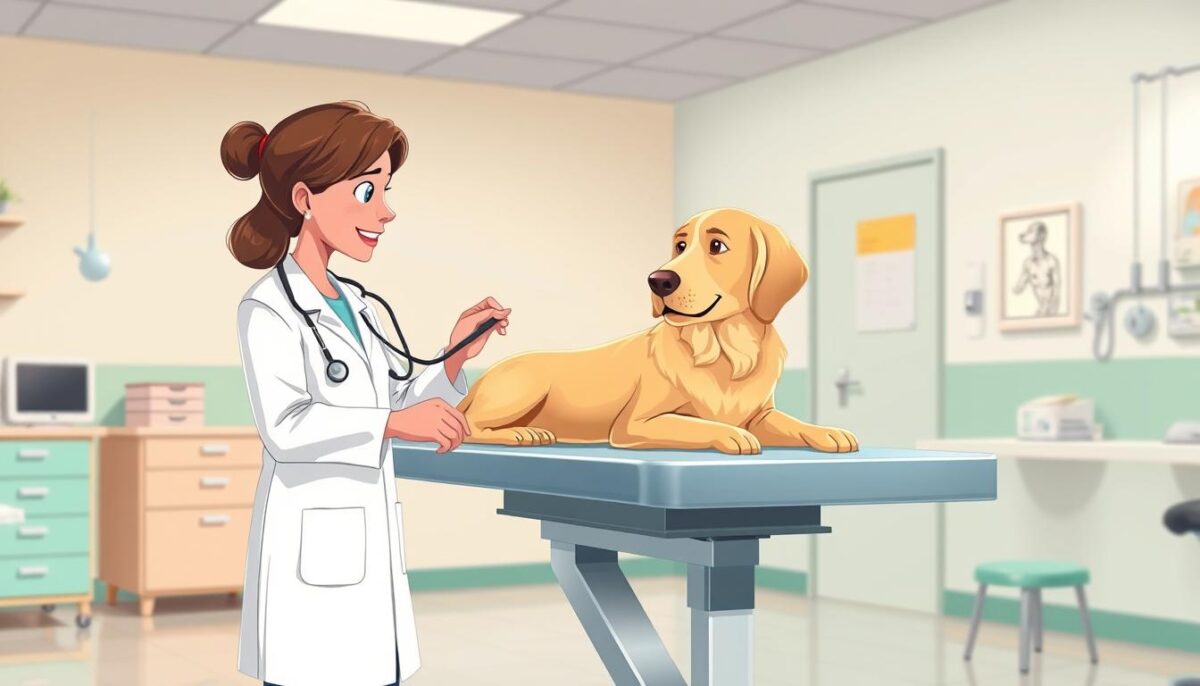
Common Mistakes to Avoid When Addressing Poop Eating
When dealing with disgusting dog habits like coprophagia, it’s crucial to avoid certain pitfalls. Dog owners often struggle to address this behavior effectively. Without the right approach, they might inadvertently make the problem worse.
To successfully stop coprophagia, it’s essential to understand common mistakes. By knowing these errors, dog owners can adopt a more effective strategy. This helps address the behavior better.
Punishment-Based Approaches
One big mistake is using punishment-based approaches. Scolding or punishing a dog for eating feces can create anxiety. It makes the behavior worse. Instead of correcting the issue, punishment can lead to fear and other behavioral problems.
Inconsistent Management
Inconsistent management is another common error. Failing to clean up after the dog or not enforcing training commands regularly can confuse the dog. It undermines efforts to stop coprophagia. Consistency is key to changing behavior.
Ignoring Potential Medical Causes
Ignoring potential medical causes is a critical mistake. Coprophagia can be a sign of underlying health issues, like nutritional deficiencies or digestive problems. Failing to address these medical causes can make it impossible to stop the behavior. Consulting a veterinarian is a crucial step in addressing coprophagia effectively.
By avoiding these common mistakes and adopting a comprehensive approach, dog owners can effectively stop coprophagia. This improves their dog’s overall health and well-being.
Long-Term Management: Creating Lasting Behavioral Change
To stop dogs from eating poop, we need a long-term plan. We must understand why they do it and how to stop them. This way, we can change their behavior for good.
Being consistent is very important. Keep using the methods we talked about, like changing their food and training them. Watch them closely and change your plan if needed.
Also, we need to fix any problems like anxiety or boredom. These can make dogs eat poop. Give them fun things to do and places to play. With time and effort, we can solve this problem for good.
FAQ
Why does my dog eat poop, and is it normal?
Can coprophagia be a sign of an underlying medical issue?
How can I stop my dog from eating poop?
Are there any health risks associated with dogs eating feces?
Can I use punishment to stop my dog from eating poop?
How can I ensure long-term behavioral change in my dog?
When should I consult a veterinarian about my dog’s coprophagia?
Can coprophagia be related to my dog’s diet?
If you’d like to explore more about pet behavior and health issues, here are some trusted sources that provide detailed information:


